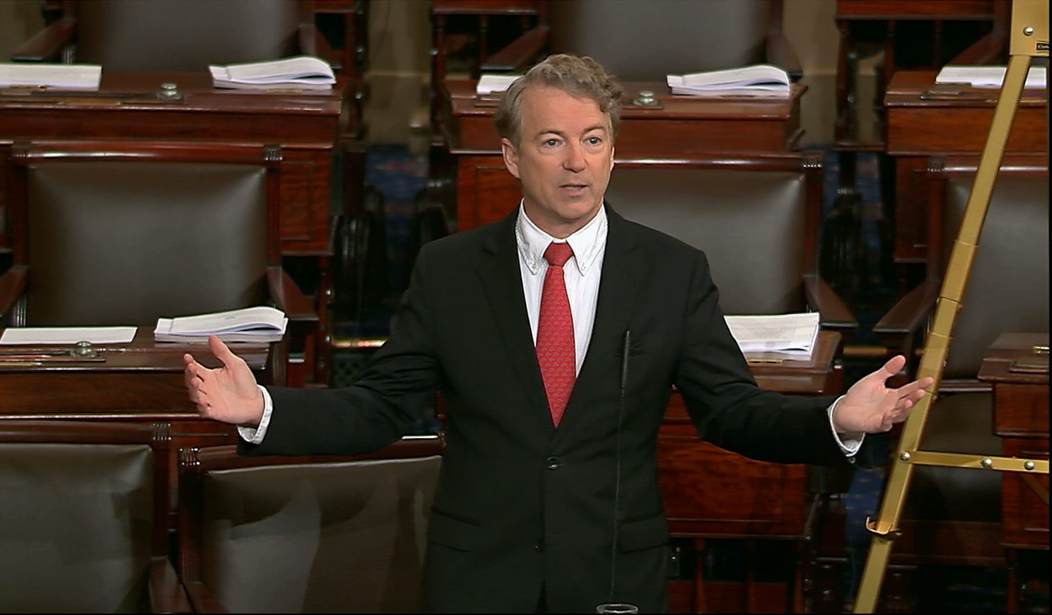WASHINGTON – While against a government shutdown, Sen. Rand Paul (R-Ky.) said on Tuesday that keeping the government operating on short-term spending packages, resulting in the borrowing of about $1 million a minute, is not a good solution, either.
Paul’s opposition led to a short overnight shutdown on Thursday as he delayed consideration of the bipartisan budget deal.
During a hearing titled “Terrible, No Good, Very Bad Ways of Funding Government,” lawmakers from both sides of the aisle agreed that Congress is failing to complete its most basic duty: keeping the government open for business.
“I can’t think of a better way to describe how dysfunctional Congress is with its power of the purse,” Paul said at the hearing of the Senate Homeland Security and Governmental Affairs Subcommittee on Federal Spending Oversight and Emergency Management, which he chairs.
The last time Congress passed all appropriations bills on time was 1997, which was only the fourth instance all appropriations were done since 1977. That’s four times in 41 years. Since 2011, Congress has passed 34 continuing resolutions, resulting in program uncertainty, delays for agency planning and increased costs to the taxpayer.
According to Maya MacGuineas, president at Committee for a Responsible Federal Budget, the most recent CR, which ended a brief government shutdown, added $31 billion to the national debt. If made permanent, that bill would have amounted to about $300 billion in borrowing. Projections are that the budget deal will add $300 billion to $400 billion to the national debt.
“This borrowing is being added to bills without any discussion,” MacGuineas said during the hearing, adding that bipartisan deals only seem to get done because lawmakers from both sides get to borrow for things they want. “It’s as if the issue of deficit and debt have just kind of disappeared, and because there are these must-pass bills, there’s always an opportunity to tack more things on.”
In 2017, the debt rose to the highest level relative to the economy since World War II. That debt is expected to grow by about $1.5 billion with the added cost of the GOP tax law, and there will be continued costs associated with CRs.
“We’re in the midst of what I see as a fiscal free-for-all,” MacGuineas said.
Ranking Member Gary Peters (D-Mich.) said in his opening remarks that Tuesday’s hearing touched on the heart of Congress’ function as an institution.
“This is our most basic job, and the American people quite frankly just expect us to get it done,” he said. “It’s a problem that has gone on far too long, and we have become accustomed to it. It’s become the new normal, and the purpose of today’s hearing is to say, ‘Enough is enough.’”
He added that Congress has failed to live up to its own standards, as outlined in the 1974 Congressional Budget Act, which established a timeline for enacting funding priorities.
In January, Paul introduced the Shutdown Prevention Act, which says that at the end of the fiscal year, anything not funded would automatically be funded at 99 percent of the previous budget. The legislation has not garnered any sponsors.
Paul said the measure gives agencies a “minimum level of certainty,” but the 1 percent penalty should be enough to get lawmakers to complete appropriations bills on time. He asked the panel if denying congressional recesses could be another way to get lawmakers to pass budget resolutions on time.
Alice M. Rivlin, an economics fellow at the Brookings Institution, said she believed Paul’s legislation would help the situation, and she also supports the proposal to deny recesses until budget resolutions are passed.
“You’d be surprised how often people want to either go home or go somewhere else besides Washington, and that might help,” Paul said.
MacGuineas agreed with Rivlin that the automatic CRs would be helpful.
“Preoccupation with short-term budget warfare makes it impossible for the Congress to face up to the long-run challenges ahead and adopt policies to deal with them,” Rivlin told lawmakers.
She argued that extreme partisanship is the most evident catalyst for budget gridlock, while adding that the bickering and blaming over CRs or converting them to omnibus bills has “eclipsed serious efforts to craft long-term budget policy and economic policy.”
Paul agreed that omnibus bills are about as bad as CRs.
“How can Congress do proper oversight of spending when we throw everything into one giant trillion-dollar bill, sometimes with only hours to scrutinize and no chance to amend?” Paul asked.









Join the conversation as a VIP Member